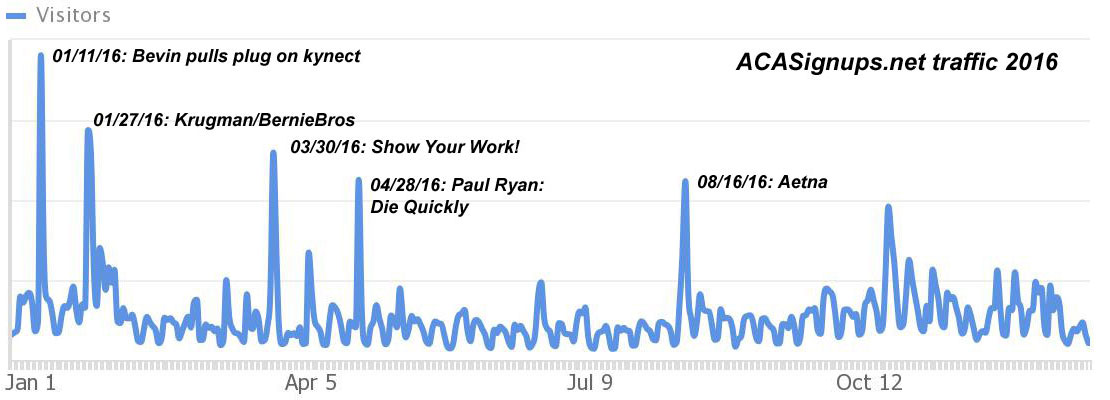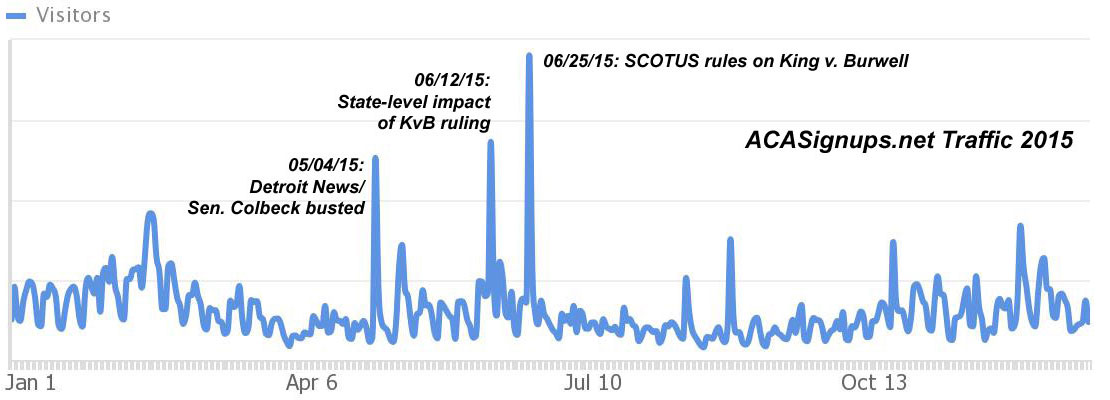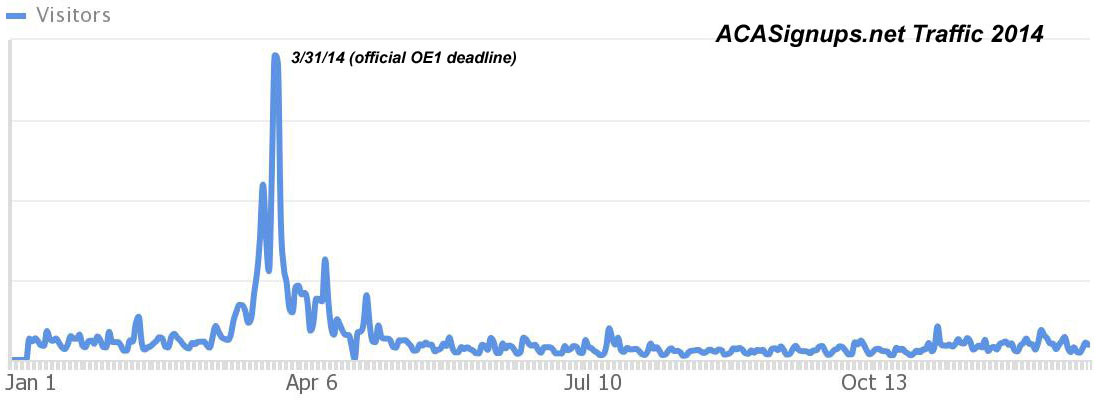2016 ACASignups Greatest Hits
It's New Year's Day, so I figured I should indulge in a little year-end navel-gazing by looking back and seeing which posts generated the most traffic throughout the year. There's a good chance that this site won't survive the new year anyway, so what the heck.
Below is a daily traffic graph showing the days with the biggest traffic spikes, along with the specific stories driving those spikes. I hope you don't mind, but I'd rather not post the actual numbers involved publicly.
As you can see, in 2016, there were 5 stories in particular which captured tons of traffic:
I was a bit obsessive about the Kentucky gubernatorial race in the fall of 2014, given GOP candidate Matt Bevin's campaign promise to kill off the successful, perfectly running and beloved kynect ACA marketplace for no particular reason (along with killing off ACA Medicaid expansion). Needless to say, he won in spite of (or possibly because of?) these campaign promises. In the end, he did kill off the kynect exchange, although kynect is still operating at a minimal level. It answers questions, re-routes traffic to the HC.gov federal exchange and, I believe, re-routes traffic for enrolling people in Medicaid. As for Medicaid, Bevin ended up not killing it off after all, although he is attempting to gunk up the works with a modified waiver version of the program (similar, I believe, to Indiana’s waiver-version). Anyway, this particular blog entry itself didn't really add much new info to the subject, but for whatever reason it caught the eye of MSNBC host Christopher Hayes, who tweeted out a link to it, generating a bunch of traffic.
When I posted my initial reaction to Bernie Sanders's proposed Single Payer healthcare plan back in late January, I knew that some Bernie fans and other single payer advocates would be disappointed at my take, but I never expected the scope and intensity of the backlash over it. In one fell swoop, I somehow went from being considered a darling of the progressive/single payer movement to a Benedict Arnold who had "sold out" to my "corporate healthcare masters", "betraying those who believed in me", bla bla bla. Two days after I wrote up my response, Paul Krugman at the NY Times, who had been subjected to similar attacks from die-hard Bernie supporters, made my response the centerpiece of his own blog entry, unhelpfully titled "Health Wonks and Bernie Bros". This cranked the outrage level amongst Bernie supporters to 11 and even kicked off a domino-effect-like series of coverage by others which led to my somehow being simultaneously defended (sort of) by The Intercept's Glenn Greenwald (with whom I disagreed entirely on this issue) and being attacked (sort of) by Parker Molloy (with whom I agreed 100%). Surreal.
Aside from the actual open enrollment data tracking which has always been the core focus of ACA Signups, there were two major projects which I worked on in 2016. The far larger one was the "2017 Average Rate Hike" projections which I worked on throughout the entire summer and autumn, but earlier in the year I devoted a few days to compiling this pie chart. I was a bit surprised at the huge positive response it generated on Twitter and other social media, especially among other healthcare wonks and reporters; while there are plenty of other similar charts out there from other outlets, they usually stick to the major divisions (ESI, Medicare, Medicaid, Indy Market and Uninsured). I appear to be the first one to delve deeper into those categories and further break them out by type of Medicare, Medicaid, ESI and so forth. In any event, I'm extremely proud of the work I did here, and it should come in very handy (with some minor revisions/updates) as the Republican Party goes about tearing up and/or gutting the ACA, Medicaid and Medicare over the next year or two.
In short, a post explaining why separating out people into "high risk pools", which is being sold as a solution to the high premium/deductible issue for the individual market by Republicans, may look good on paper but is an utter disaster in practice. I'm not honestly sure why this post captured so much traffic in particular; perhaps it was the clickbait headline...which I stand by nonetheless.
This was more of a curated series of posts by myself, Andrew Sprung (xpostfactoid) and Michael Hiltzik (of the L.A. Times) in which we collectively note that for all the hand-wringing by insurance carriers like Aetna, UnitedHealthcare and Humana about losing money on the individual market under the ACA, they all seem to be making a buttload of money in the managed Medicaid/Medicare markets...in large part thanks to, yes, the ACA. Perhaps that could be used by the government when it comes to exchange participation negotiations?
Of course, all of this is likely moot going forward. With the GOP planning on beginning the destruction of the ACA in as little as 2 days and Donald Trump being sworn in as President in 19 days, I highly doubt anyone is gonna be holding Aetna's feet to the fire on just about anything anytime soon.

Anyway, that was 2016 in a nutshell.
For 2017, I suspect site traffic will be pretty high through right around April or so, as I try to keep up with the insanity of the Trump Administration/GOP-controlled Congress as they rip everything apart while lying through their teeth about who and how many people will be screwed by their actions. As it happens, I'm officially committed to maintaining the site up through the end of April as well. After that...well, that depends on what sort of arrangements I can make with advertisers, donations and/or other sources of revenue. Then again, depending on the outcome of the Trump/GOP's actions, it might be a moot point by then as well.
As an aside, here are similar charts for 2014 and 2015. As you can see, there were fewer significant spikes in the prior years, although nothing can compare to the big one on March 31, 2014 (the official deadline of the very first Open Enrollment Period, although they also tacked on a 2-week "overtime" period to handle the overflow traffic). I've yet to surpass that record and likely never will (the day of the Supreme Court's King v. Burwell ruling came close).


How to support my healthcare wonkery:
1. Donate via ActBlue or PayPal
2. Subscribe via Substack.
3. Subscribe via Patreon.



